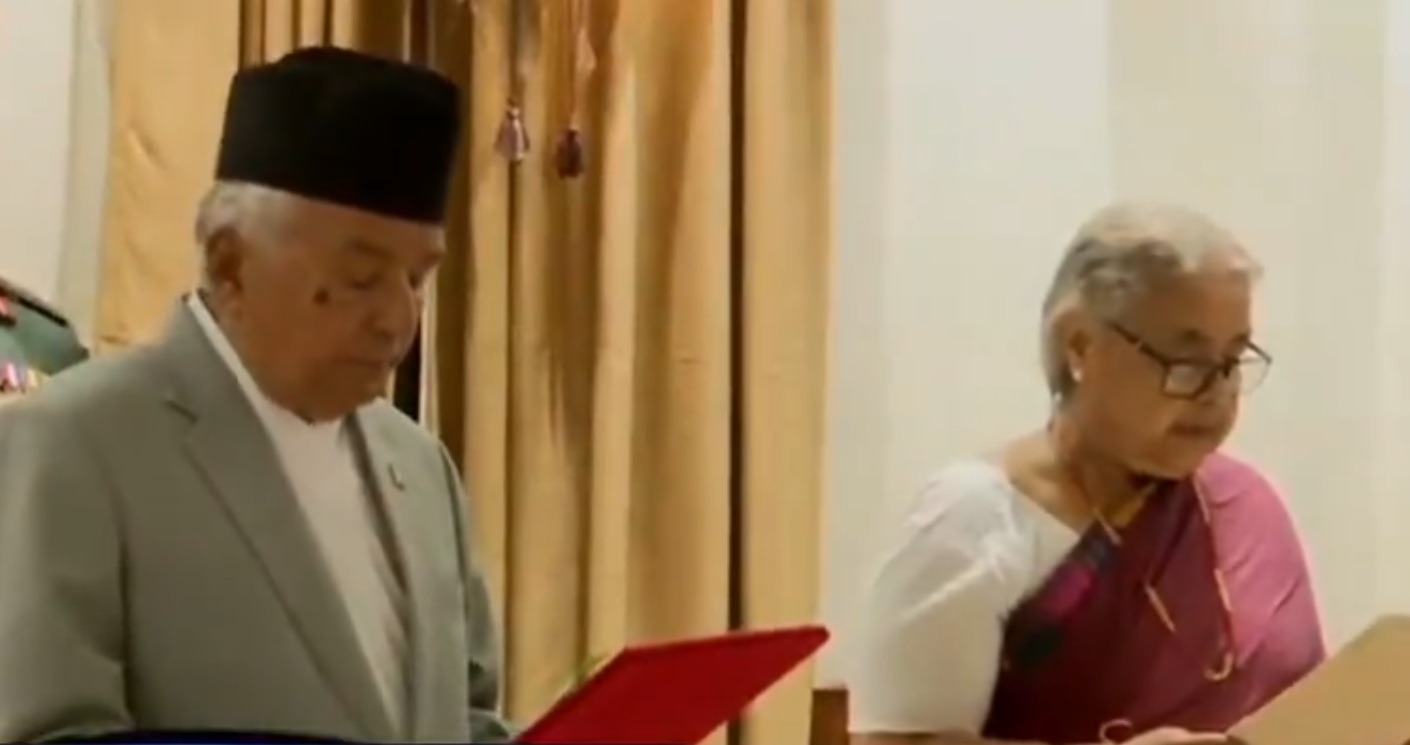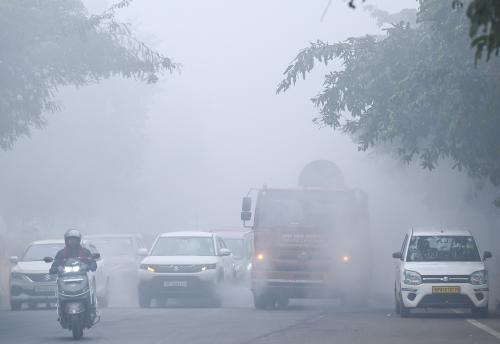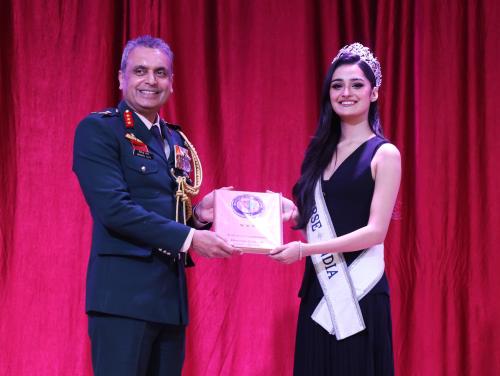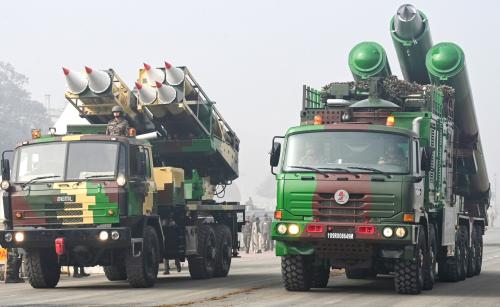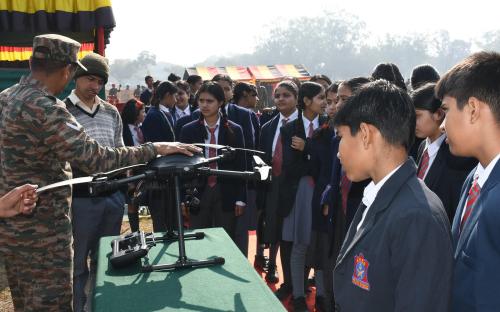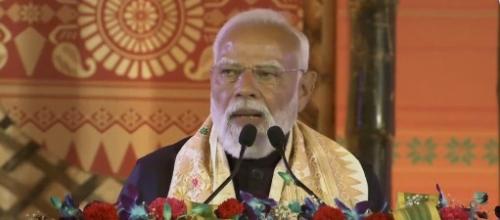Kathmandu, Sep 12 (IANS) Sushila Karki, 73, was sworn in as Nepal's interim Prime Minister late Friday evening, thus becoming the first-ever woman PM of the Himalayan nation.
Karki, also the country’s first woman Chief Justice, took the oath of office from President Ram Chandra Poudel who held extensive consultations with leaders of the Gen-Z protests, constitutional experts, and the army chief, throughout the day.
Following the fall of KP Sharma-Oli led government during the violent Gen-Z protests on Monday, Karki was the pick of activists who have taken to the streets, protesting against Oli's rule.
Discussions with Gen-Z protestors and other stakeholders were prolonged over the issue of dissolving the House of Representatives, the lower house, before the new Prime Minister is sworn in or after it.
Gen-Z protestors agreed on Karki’s name, paving the way for her appointment as Prime Minister even though several non-political candidates were floated as alternatives.
There is, however, no constitutional provision allowing anyone who is not a member of the House of Representatives to hold the post. Karki has been appointed under the "principle of necessity".
According to Article 76 of Nepal’s Constitution, only a member of the House of Representatives can become Prime Minister. This criterion disqualifies Karki, as even members of the National Assembly, the upper house of Parliament, are barred from holding the post.
Likewise, Article 132 (2) of the Constitution prevents her from becoming Prime Minister. It states that no person who has once held the office of Chief Justice or Judge of the Supreme Court shall be eligible for appointment to any government office, except as otherwise provided in the Constitution.
"She was appointed as Prime Minister based on the principle of necessity, a system practiced in Nepal time and again since the 1950 revolution,” said Bipin Adhikari, a constitutional lawyer. "But the principle of necessity is essentially not the rule of law. If we abandon the Constitution under one pretext or another, a habit develops of violating it, which may bring more trouble in the future," he stated.
The expert, however, added that Karki could be trusted with the role, given her record of protecting the Constitution as Justice and Chief Justice of the Supreme Court, provided that the arrangement is temporary and power is handed over to an elected government after holding fresh elections.
Karki's choice as Prime Minister has so far been lauded across Nepal.
Former Chief Justice Kalyan Shrestha, who preceded Karki in 2016, told IANS that he trusted her integrity and capability. “I cannot judge her quality as a political leader, but from the judicial point of view, I have seen her leadership and she can be relied upon," Shrestha said.
Former Prime Minister Baburam Bhattarai has also welcomed Karki's appointment. "It is very positive and appropriate that the youths of Gen Z, who are prepared to lead a new Nepal, have recommended former Chief Justice and a capable, clean figure, Sushila Karki, to lead the interim government. She must be given full national cooperation and support. From our side as well, we extend full support and advance congratulations to her," he said in a press statement.
Adhikari, the constitutional lawyer, praised her "integrity" and "capability", but raised concerns about her ability to coordinate among stakeholders in the current context of uncertainty. He stressed that, in addition to holding elections within the stipulated timeframe, her government must also prosecute those responsible for the killing of young protestors and bring those involved in vandalism and arson to justice under criminal law.
According to a local media report quoting Nepal Police, as many as 51 people, including some security personnel, have been confirmed killed during the Gen-Z protests, which also caused large-scale destruction of public and private property, including businesses. "Specific measures should also be taken to address the demands of Gen-Z protestors related to corruption and good governance," Adhikari added.
The newly-appointed Prime Minister was born in 1952 into a middle-class family in Morang District's Biratnagar in eastern Nepal. At a time when few girls went to school, her parents encouraged her to pursue education.
Karki came from a political family — her father, inspired by B P Koirala, Nepal's first elected Prime Minister, joined the Nepali Congress. Karki earned her Bachelor's degree (LLB) in law from Tribhuvan University in 1972 and completed a Master’s degree in political science in 1975 from Banaras Hindu University in India's Varanasi. After completing her studies, she began her law practice in Biratnagar in 1979.
She became a senior advocate in 2007. In 2009, she was appointed an ad-hoc judge in the Supreme Court and was promoted to permanent judge in November 2010. In April 2016, she was appointed Chief Justice of the Supreme Court.
While being the Chief Justice, Karki delivered a landmark ruling in January 2017 disqualifying the then-powerful anti-corruption chief Lok Man Singh Karki, who was accused of terrorising politicians, bureaucrats, and businessmen by misusing his power.
Her stance on another controversial case, however, sparked backlash when her ruling on the appointment of a police chief went against the coalition government led by the Nepali Congress and CPN (Maoist Centre) with lawmakers eventually initiating an impeachment motion against her. She was suspended briefly until the Supreme Court invalidated the impeachment and reinstated her as Chief Justice.
Earlier, in 2012, as a Supreme Court justice, she delivered the verdict sentencing then-serving minister Jaya Prakash Gupta on corruption charges.
Karki's husband, Durga Subedi, was a Nepali Congress leader involved in Nepal's first-ever plane hijacking in 1973 to fund the party's armed rebellion against the autocratic Panchayat regime. The Royal Nepal Airlines plane was targetted after reports that it was carrying a large sum of cash.


